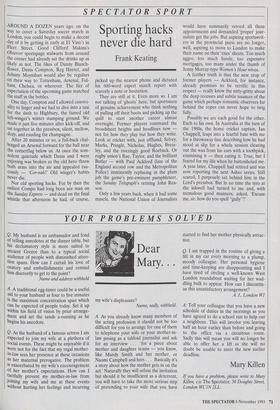SPECTATOR SPORT
Sporting hacks never die hard
Frank Keating
AROUND A DOZEN years ago, on the way to cover a Saturday soccer match in London, you could begin to make a decent day of it by getting in early at El Vino's in Fleet Street. Good Clifford Makins's Observer sportspage stalwarts from around the corner had already set the drinks up as likely as not. The likes of Danny Blanch- flower, Denis Compton, Reg Hayter, and Johnny Moynihan would also be regulars on their way to Tottenham, Arsenal, Ful- ham, Chelsea, or wherever. The fizz of expectation of the upcoming game matched the stuff in the bottles.
One day, Compton and I allowed convivi- ality to linger and we had to dive into a taxi for the dash to Highbury, the famed old left-winger's winter stamping ground. We made it just five minutes after kick-off, and sat together in the pressbox, silent, mellow, dozy, and exuding the champagne.
After 20 minutes or so, a full-back chal- lenged an Arsenal forward for the ball near the cornerflag below us. At once the som- nolent quietude which Denis and I were enjoying was broken as the old hero threw both arms into the air and appealed rau- cously — `Cor-nah!' Old winger's habits never die.
Nor old sporting hacks. For by then the onliest Compo had long been ace man on the Sunday Express — and dead on the final Whistle that afternoon he had, of course,
picked up the nearest phone and dictated his 600-word expert match report with scarcely a note or hesitation.
They are still at it. Even more so. I am not talking of 'ghosts' here, but sportsmen of genuine achievement who think nothing of pulling off their boots and picking up the quill to start another career almost overnight. Former players command the broadsheet heights and headlines now — not for how they play but how they write. Look at cricket with, just offhand, Selvey, Marks, Pringle, Nicholas, Hughes, Brear- ley, and the rivetingly good Roebuck. Or rugby union's Rae, Taylor, and the brilliant Butler — with Paul Ackford (late of the England second row and the Metropolitan Police) imminently replacing in the plum job the game's pre-eminent pamphleteer, the Sunday Telegraph's retiring John Rea- son.
Only a few years back, when it had some muscle, the National Union of Journalists
would have summarily vetoed all these appointments and demanded 'proper' jour- nalists get the jobs. But aspiring sportswrit- ers in the provincial press are no longer, well, aspiring to move to London to make their name on their `exes' sheets. Too much aggro, too much hassle, too expensive mortgages, too many under the thumb of Jenny Murray-type Women's Hour wives.
A further truth is that the new crop of former players — Ackford, for instance, already promises to be terrific in this respect — really know the nitty-gritty about the deep recesses and subtle nuances of the game which perhaps romantic observers far behind the ropes can never hope to twig fully.
Possibly we are each good for the other. Each to his own. In Australia at the turn of the 1980s, the home cricket captain, Ian Chappell, leapt into a fearful bate with me for a throwaway line describing how he had stood at slip for a whole session clearing out the wax from his ears with a toothpick, examining it — then eating it. True, but I feared for my life when he buttonholed me. A year later, Chappell had retired and was now reporting the next Ashes series. Still scared, I purposely sat behind him in the Lord's pressbox. But in no time the tyro at the inkwell had turned to me and, with tremulous good manners, asked, 'Excuse me, sir, how do you spell "gully"?'










































































 Previous page
Previous page